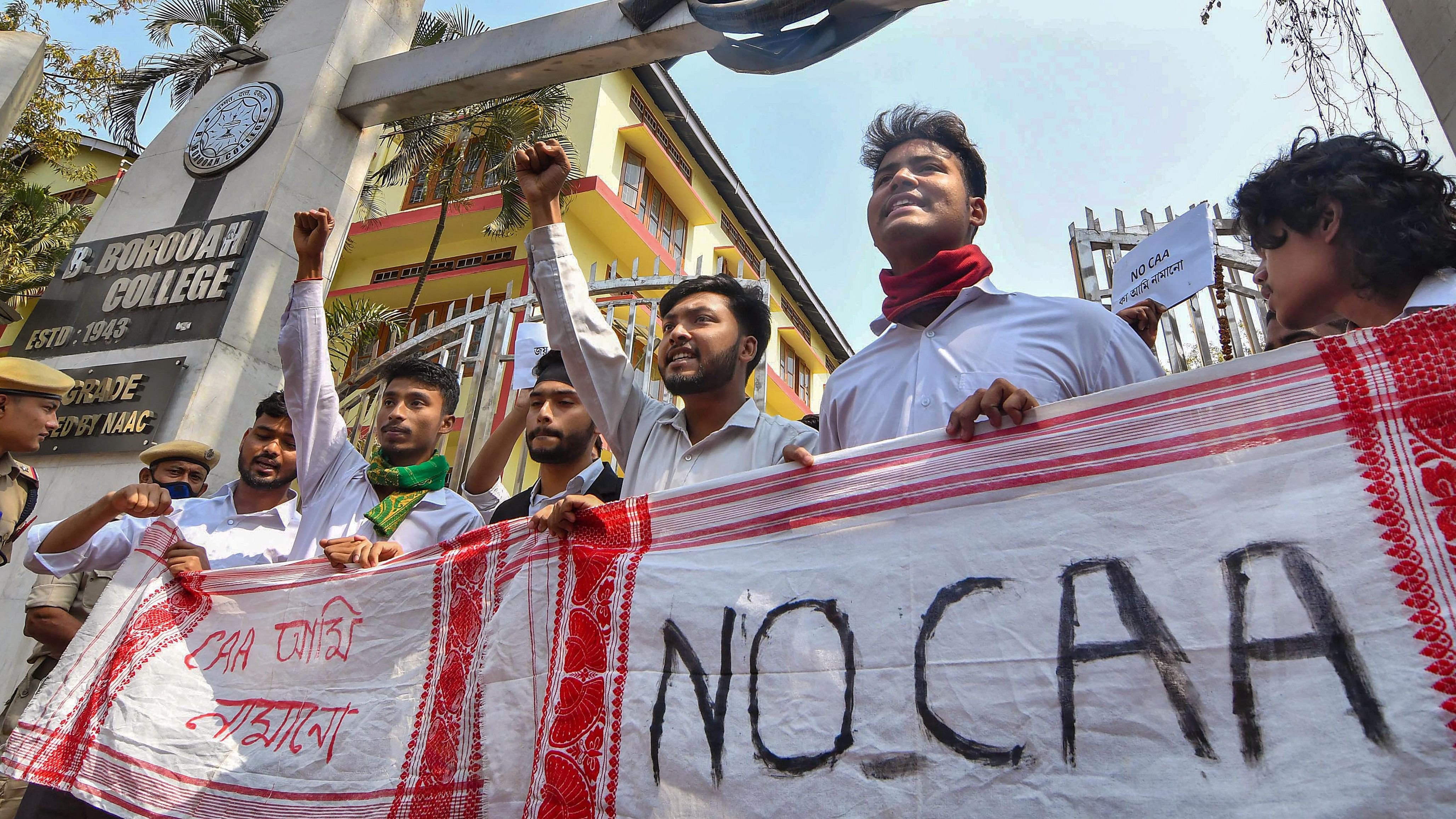
College students protest against CAA a day after the Ministry of Home Affairs notified the rules for implementation of the Citizenship (Amendment) Act, in Guwahati, Tuesday, March 12, 2024.
Credit: PTI Photo
Thiruvananthapuram/New Delhi: With states like Kerala and Tamil Nadu making it clear that they will not implement the contentious Citizenship (Amendment) Act, 2019, they may not be able to walk the talk, as states are legally bound to implement any law passed by Parliament.
Since the granting of citizenship is a prerogative of the Union government, it will be challenging for states to abstain from implementing the CAA. On Monday, the central government notified the rules for the implementation of the CAA 2019, which offers citizenship to persecuted non-Muslim minorities from Muslim-majority Pakistan, Afghanistan, and Bangladesh.
Chief Ministers M K Stalin of Tamil Nadu and Pinarayi Vijayan of Kerala have announced that they will not implement the changes in the citizenship law, which now makes religion the basis for granting citizenship to those fleeing persecution in the aforementioned countries. Their West Bengal counterpart, Mamata Banerjee, has also made it clear that she will continue to oppose the "unconstitutional" CAA.
Article 256 of the Constitution on 'Obligation of States and the Union' says that the "Executive power of every state shall be so exercised as to ensure compliance with the laws made by Parliament and any existing laws which apply in that state, and the executive power of the Union shall extend to the giving of such directions to a state as may appear to the government of India to be necessary for that purpose."
Former Secretary General of Lok Sabha PDT Achary told DH that states would have no other option but to implement the law passed by the Parliament. At the same time, he said, the states could take up their grievances over the law, including the alleged violation of the Constitution, with the Supreme Court.
While asserting that states have limited authority in the implementation of the citizenship law, senior lawyer Sanjay Hegde linked the opposition to the amendments to potential objections from states if the Centre proceeds with the National Register of Citizens, which is viewed by many as discriminatory against minorities.
"The grant of citizenship is the prerogative of the Union Government. States have no role in that. What the governments are indicating is possible non-cooperation in the event of an NRC-type operation," Hegde told DH.
Senior lawyer and Rajya Sabha DMK MP P Wilson stated, "Under the Citizenship Act, the power is to be exercised by the Centre, and it has to nominate certain authorities or officers for processing the application. Power is conferred on district collectors; states can instruct those officers not to exercise power. We can certainly request the Centre not to nominate these officers for this purpose."
Sources indicate that the Kerala government, which has already approached the Supreme Court against the Citizenship (Amendment) Act (CAA), intends to continue pursuing legal avenues.
In West Bengal's Barasat, Mamata Banerjee claimed that the CAA was "merely a precursor" to implementing the NRC.
“I urge the people to think several times before applying for citizenship under the law. That’s because the rules provide no clarity on what happens to the status of existing citizens once they make a fresh application. I apprehend that existing citizens would automatically be first designated as illegal immigrants and then left at the mercy of the committee to grant them citizenship afresh,” she said.
“Those not found qualified would be sent to detention camps. It’s a ploy to snatch away citizenship rights, not granting one,” she said adding, “A conspiracy is being hatched to evict Christians, Muslims, Namasudras and Bengalis from this country, which I won’t allow. It’s a ploy to divide Bengal.”

